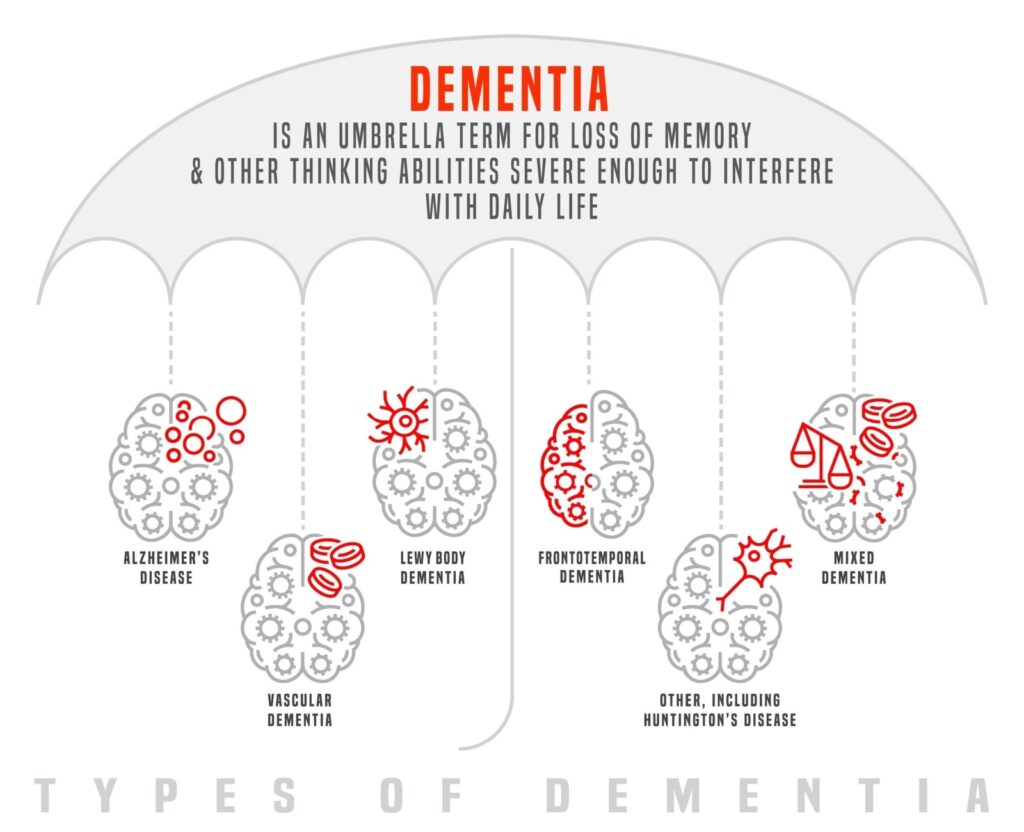Key Takeaways
- Dementia isn’t directly inherited like eye color, but family history can increase your risk
- Having a grandparent with dementia slightly raises your chances, but most cases aren’t hereditary
- Lifestyle choices play a bigger role than genetics in preventing dementia
- Different types of dementia have varying genetic patterns
- Planning ahead with memory care and senior living options helps families prepare
Can I Get Dementia from My Family?
When your grandparent develops dementia, it’s natural to wonder if you’ll face the same challenges someday. Many families worry about genetic connections and what this means for future generations. Understanding cognitive health patterns across generations can help inform your planning decisions.
While having a grandparent with dementia does slightly increase your risk, most forms of dementia aren’t directly passed down through families like other inherited conditions. Understanding the real genetic connections can help you make informed decisions about your health and future planning. Learning to recognize early warning signs becomes particularly valuable when family history exists.
Understanding the Genetic Connection Between Generations
Genes pass from grandparents to grandchildren, but dementia inheritance works differently than you might expect. Unlike conditions such as Huntington’s disease, most dementia cases don’t follow a clear genetic pattern.
There’s an important difference between risk factors and direct inheritance. Risk factors increase your chances of developing a condition, while direct inheritance means you’ll definitely get it if you carry certain genes. The Alzheimer’s Association provides detailed resources about genetic factors and how they influence disease development.
Dementia typically falls into the risk factor category rather than direct inheritance. This means having affected family members makes you more susceptible, but it doesn’t guarantee you’ll develop the condition.
For comprehensive support when dementia does occur, memory care services provide specialized programs designed for each resident’s unique needs. Families also benefit from our respite care options when they need temporary support during caregiving journeys.
How Likely Are You to Develop Dementia If Your Grandparent Had It?
Statistical research shows that having a grandparent with dementia increases your risk by about 15–20% compared to people without a family history. However, this still means your overall chances remain relatively low.
Family history becomes more concerning when multiple relatives are affected or when dementia develops at a younger age. The age at which your grandparent first showed symptoms also influences your risk level. Resources like the National Institute on Aging offer research-based information about genetic patterns and risk factors.
Factors That Increase Your Risk
Several patterns in family history can raise your dementia risk beyond having just one affected grandparent. Multiple family members with dementia across different generations create a stronger genetic connection.
Early-onset dementia in relatives—typically before age 65—suggests a higher likelihood of genetic involvement. Some types of dementia show stronger family patterns than others, making genetic factors more significant in certain cases.
Different Types of Dementia & Their Genetic Patterns
Alzheimer’s Disease and Family History
Alzheimer’s represents the most common form of dementia, affecting inheritance patterns differently than rarer types. Most cases involve “risk genes” that increase susceptibility rather than “direct-cause genes” that guarantee development.
The APOE gene is the most well-known risk factor, but carrying it doesn’t mean you’ll definitely get Alzheimer’s. Rare familial Alzheimer’s accounts for less than 5% of all cases and typically appears before age 60. Understanding these patterns helps families navigate caring for parents with dementia while processing their own concerns about future risk.
Vascular Dementia and Inherited Health Conditions
Vascular dementia often connects to underlying health issues that can run in families. Conditions like high blood pressure, diabetes, and heart problems increase the risk of vascular dementia when passed down through generations.
The good news is that many of these underlying conditions respond well to lifestyle changes and medical management. Prevention through healthy choices can significantly reduce your risk, even with a family history.
Frontotemporal Dementia (FTD)
Frontotemporal dementia shows the strongest genetic patterns among common dementia types. About 40% of FTD cases have a clear family history, making genetic factors more significant.
If multiple family members developed FTD, especially at younger ages, genetic testing might be recommended. This type of dementia often affects people in their 50s and 60s, earlier than other forms.
What Age Does Dementia Usually Start & How Does This Affect Risk?
Most dementia cases develop after age 65, with risk doubling approximately every 5 years. Alzheimer’s typically appears in the mid-60s to 70s, while vascular dementia often occurs slightly earlier.
Early-onset dementia before age 65 is less common but more likely to have genetic components. If your grandparent developed symptoms before this age, your risk may be higher than average. Tools like the FAST scale help families understand progression patterns and assess care needs at different stages.
The age at which relatives first showed symptoms helps healthcare providers assess your personal risk. Earlier onset in family members suggests stronger genetic involvement and may warrant closer monitoring as you age.

Reducing Your Risk When Dementia Runs in Your Family
Lifestyle Changes That Can Help
Regular physical activity stands out as one of the most effective ways to reduce dementia risk. Exercise improves blood flow to the brain and helps maintain cognitive function throughout life. The National Institute on Aging’s exercise guide provides specific recommendations for older adults.
Healthy diet choices, particularly Mediterranean-style eating patterns, support brain health and may lower dementia risk. Quality sleep and stress management also play important roles in maintaining cognitive wellness as you age.
Staying mentally and socially active through learning, hobbies, and relationships helps build cognitive resilience. These activities create mental reserves that may delay or prevent dementia symptoms. Research shows that social interactions significantly contribute to overall happiness and cognitive health.
Planning for Memory Care and Senior Living Options
Understanding memory care services helps families prepare for potential future needs. These specialized programs focus on creating safe, engaging environments for people experiencing cognitive changes. Our signature programs offer comprehensive wellness and cultural experiences designed to support cognitive health.
Families often benefit from respite care when supporting relatives with dementia. This service provides temporary relief for caregivers while maintaining quality care for their loved ones. Learning about respite care options helps prevent caregiver burnout and maintains family well-being.
Planning ahead for potential senior living needs reduces stress and improves outcomes if memory care becomes necessary. Research shows that early planning leads to better transitions and family satisfaction.
Moving Forward with Family History Knowledge
Having open conversations with healthcare providers about your family history helps create personalized prevention plans. Focus on factors you can control rather than worrying about genetic risks beyond your influence. At Inspired Living at Tampa, we understand the concerns families face when dementia affects multiple generations. Our specialized memory care programs adapt to meet changing needs, while our bilingual team helps with comfortable communication in both English and Spanish. If you’re planning ahead or need support now, contact us to schedule a tour and learn how we can help your family navigate this journey with compassion and expertise.









